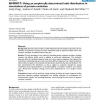Free Online Productivity Tools
i2Speak
i2Symbol
i2OCR
iTex2Img
iWeb2Print
iWeb2Shot
i2Type
iPdf2Split
iPdf2Merge
i2Bopomofo
i2Arabic
i2Style
i2Image
i2PDF
iLatex2Rtf
Sci2ools
134
click to vote
BMCBI
2005
2005
SIMPROT: Using an empirically determined indel distribution in simulations of protein evolution
Background: General protein evolution models help determine the baseline expectations for the evolution of sequences, and they have been extensively useful in sequence analysis and for the computer simulation of artificial sequence data sets. Results: We have developed a new method of simulating protein sequence evolution, including insertion and deletion (indel) events in addition to amino-acid substitutions. The simulation generates both the simulated sequence family and a true sequence alignment that captures the evolutionary relationships between amino acids from different sequences. Our statistical model for indel evolution is based on the empirical indel distribution determined by Qian and Goldstein. We have parameterized this distribution so that it applies to sequences diverged by varying evolutionary times and generalized it to provide flexibility in simulation conditions. Our method uses a Monte-Carlo simulation strategy, and has been implemented in a C++ program named Simpr...
| Added | 15 Dec 2010 |
| Updated | 15 Dec 2010 |
| Type | Journal |
| Year | 2005 |
| Where | BMCBI |
| Authors | Andy Pang, Andrew D. Smith, Paulo A. S. Nuin, Elisabeth R. M. Tillier |
Comments (0)

